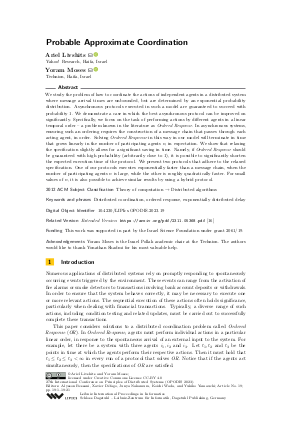@InProceedings{livshits_et_al:LIPIcs.OPODIS.2023.19,
author = {Livshits, Ariel and Moses, Yoram},
title = {{Probable Approximate Coordination}},
booktitle = {27th International Conference on Principles of Distributed Systems (OPODIS 2023)},
pages = {19:1--19:21},
series = {Leibniz International Proceedings in Informatics (LIPIcs)},
ISBN = {978-3-95977-308-9},
ISSN = {1868-8969},
year = {2024},
volume = {286},
editor = {Bessani, Alysson and D\'{e}fago, Xavier and Nakamura, Junya and Wada, Koichi and Yamauchi, Yukiko},
publisher = {Schloss Dagstuhl -- Leibniz-Zentrum f{\"u}r Informatik},
address = {Dagstuhl, Germany},
URL = {https://drops.dagstuhl.de/entities/document/10.4230/LIPIcs.OPODIS.2023.19},
URN = {urn:nbn:de:0030-drops-195090},
doi = {10.4230/LIPIcs.OPODIS.2023.19},
annote = {Keywords: Distributed coordination, ordered response, exponentially distributed delay}
}

 Creative Commons Attribution 4.0 International license
Creative Commons Attribution 4.0 International license






